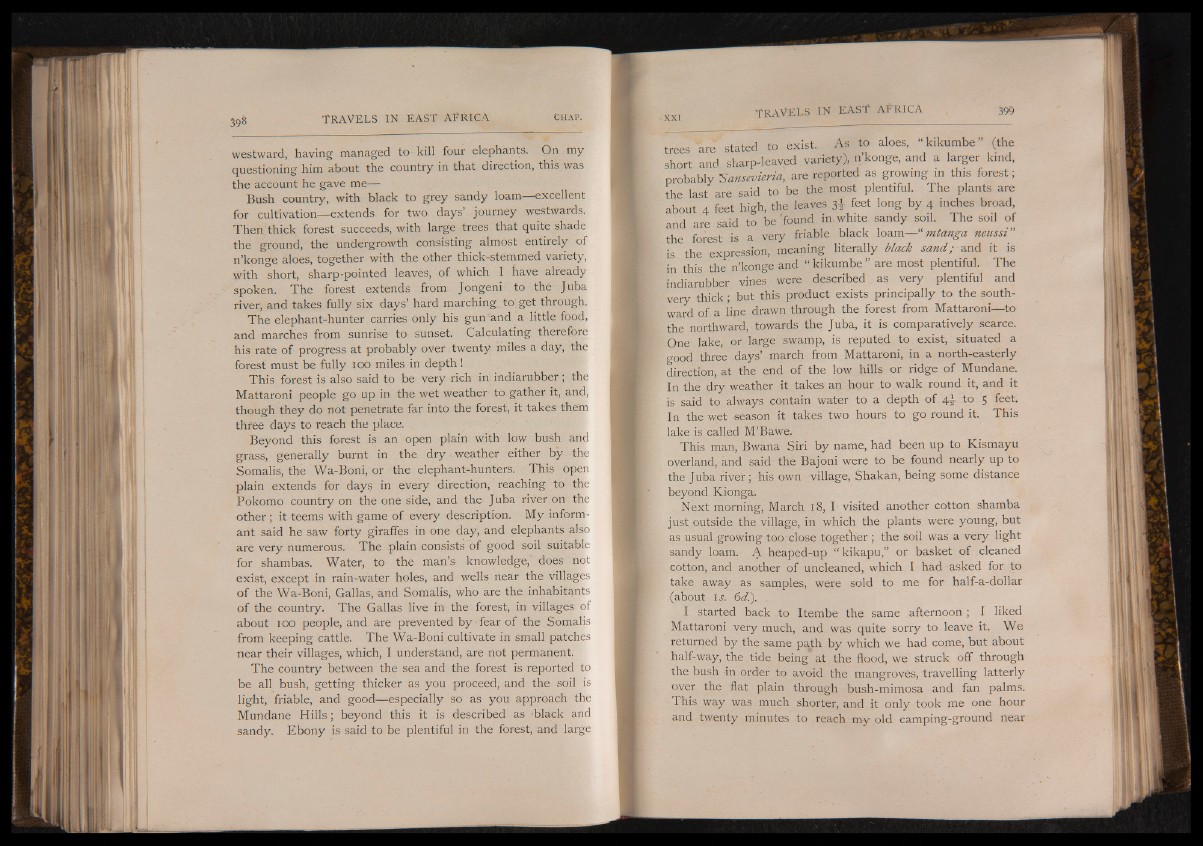
westward, having managed to kill four elephants. O n. my
questioning him about the country in that direction, this was
the account he gave me—
Bush country, with black to grey sandy loam excellent
for cultivation— extends for two days journey westwards.
Then thick forest succeeds, with large trees that quite shade
the ground, the undergrowth consisting almost entirely of
n’konge aloes, together with the other thick-stemmed variety,
with short, sharp-pointed leaves, of which I have already
spoken. The forest extends from Jongeni to the Juba
river, and takes fully six days’ hard marching, to. get through.
The elephant-hunter carries only his gun and a little food,
and marches from sunrise to sunset. Calculating therefore
his rate of progress at probably over twenty miles a day, the
forest must be fully 100 miles in depth !
This forest is also said to be very rich in indiarubber; the
Mattaroni people go up in the wet weather to gather it, and,
though they do not penetrate far into the forest, it takes the'm
three days to reach the place.
Beyond this forest is an open plain with low bush and
grass, generally burnt in the dry weather either by the
Somalis, the Wa-Boni, or the elephant-hunters. This open
plain extends for days in every direction, reaching to the
Pokomo country on the one side, and the Juba river on the
other; it teems with game of every description. My informant
said he saw forty giraffes in one day, and elephants also
are very numerous. The plain consists of good soil suitable
for shambas. Water, to the man’s knowledge,' does not
exist, except in rain-water holes, and wells near the villages
of the Wa-Boni, Gallas, and Somalis, who are the inhabitants
of the country. The Gallas live in the forest, in villages of
about 100 people, and are prevented by fear of the Somalis
from keeping cattle. The Wa-Boni cultivate in small patches
near their villages, which, I understand, are not permanent.
The country between the sea and the forest is reported to
be all bush, getting thicker as you proceed, and the soil is
light, friable, and good— especially so as you approach the
Mundane Hills; beyond this it is described as -black and
sandy. Ebony is said to be plentiful in the forest, and large
trees are stated to exist. As to aloes, “ kikumbe” (the
short and sharp-leaved variety), n’konge, and a larger kind,
probably Sansevieria,\ are reported as growing in this forest ;
the last are said to be the most plentiful. The plants are
about 4 feet high, the leaves 3* feet long by 4 inches broad,
and are said to be'found in. white sandy soil. The soil of
the forest is a very friable black l o a m mtanga neussi"
is the expression, meaning literally black sand; and it is
in this the n’konge and “ kikumbe ” are most plentiful. The
indiarubber vines, were described as very plentiful and
very thick; but this product exists principally to the southward
of. a line drawn through the forest from Mattaroni— to
the northward, towards the Juba, it is comparatively scarce.
One lake or large swamp, is reputed to exist, situated a
good three days’ march from Mattaroni, in a north-easterly
direction, at the end of the low hills or ridge of Mundane.
In the dry weather it takes an hour to walk round it, and it
is said to always contain water to a depth of 4^. to 5 feet.
In the wet season it takes two hours to go round it. This
lake is called M’Bawe.
This man, Bwana Siri by name, had been up to Kismayu
overland, and said the Bajoni were to be found nearly up to
the Juba river; his own village, Shakan, being some distance
beyond Kionga.
Next morning, March 18, I visited another cotton shamba
just outside the village, in which the plants were young, but
as usual growing too close together ; the soil was a very light
sandy loam. A heaped-up “ kikapu,” or basket of cleaned
cotton, and another of uncleaned, which I had asked for to
take away as samples, were sold to me for half-a-dollar
(about is. 6d.).
I started back to Itembe the same afternoon ; I liked
Mattaroni very much, and was quite sorry to leave it. We
returned by the same path by which we had come, but about
half-way, the tide being at the flood, we struck off through
the bush in order to avoid the mangroves, travelling latterly
over the flat plain through bush-mimosa and fan palms.
This way was much shorter, and it only took me one hour
and twenty minutes to reach my old camping-ground near